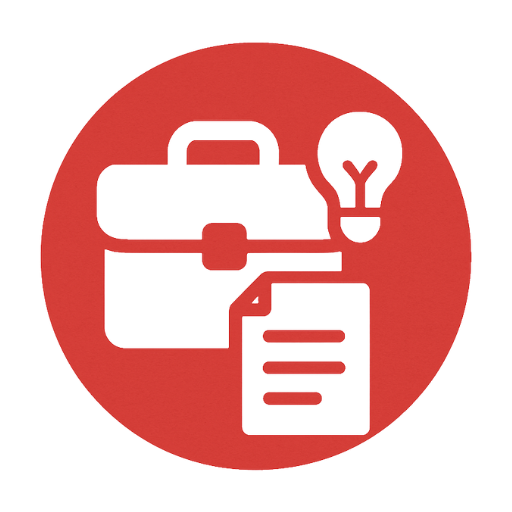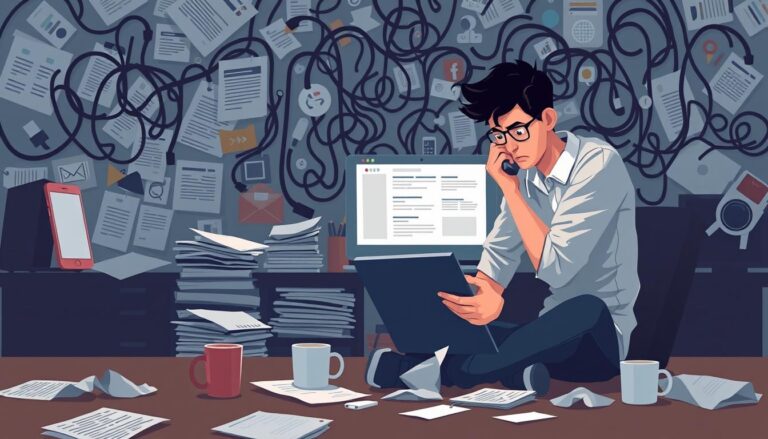Tips to Handle Stressful Interview Situations

Interviews can be tough, but being ready is crucial. Managing stress and staying calm under pressure is key. It helps show your skills and personality.
Being well-prepared lets you handle tough interview situations with confidence. This makes a great impression and lowers your stress.
With the right strategies, a stressful interview can become a chance to stand out. Staying focused and calm lets you show your strengths. It proves you’re a good fit for the job.
Understanding Interview Anxiety: Why We Get Nervous
Interview anxiety is a big problem that can really hurt how well you do. It’s when people get stressed and worried before an interview. This stress comes from many things, like fear of the unknown, wanting to do well, and making a good impression.
Signs of interview stress include a fast heartbeat, feeling sick, and sweating. Knowing these signs is the first step to handling them. When you know what you’re feeling, you can start to relax. For example, you can try deep breathing or meditation to calm down.
Interview anxiety also affects your mind. It can make you doubt yourself, feel less confident, and fear failure. Managing stress well is key to beating these mental hurdles. By figuring out why you’re anxious, you can find ways to deal with it. This could be through positive thinking or imagining yourself doing well.
Understanding why you get anxious and what it feels like helps you get ready for interviews. This knowledge lets you manage your anxiety better. It can make you perform better and boost your chances of success.
Preparation: Your First Line of Defense
Preparation is your strongest ally in a high-pressure interview. It helps lower your stress and boosts your confidence.
Practicing your answers in front of a mirror is a good start. It lets you see your body language and facial expressions. This helps you improve your non-verbal signals. Plus, it makes you more comfortable with your answers, so you won’t stumble during the interview.
Scheduling mock interviews is another smart move. Mock interviews mimic the real thing, helping you get used to the format and questions. You can have a friend or family member do it, or record yourself to spot areas for improvement.
Working on a 30-second pitch about yourself is also helpful. Your pitch should briefly cover your background, skills, and why you’re the best fit for the job. Practicing it ensures you can introduce yourself confidently and clearly at the interview’s start.
By using these preparation tips, you’ll be ready to face stressful interviews with confidence and grace.
The Night Before: Setting Yourself Up for Success
Getting ready the night before an interview can really help you feel less stressed. One big step is to do your homework on the company. Learn about their mission, values, and latest successes. This way, you can show how you fit into their plans.
Plan Your Logistics: Make sure you know where the interview is and how to get there. Try to visit the place a day or two early to avoid any last-minute mix-ups. Also, pick out your outfit and have it ready. This saves time and eases morning stress.

It’s also smart to cut down on caffeine and get plenty of sleep. Being well-rested makes you more alert and calm during the interview. A quick review of your notes is good, but don’t cram too much in.
By following these tips, you’ll be ready and confident for your interview. This prep not only lowers your stress but also boosts your performance.
Essential Tips to Handle Stressful Interview Situations
Learning to handle stress in interviews can really help you succeed. Interviews can be very stressful for many people. But, with the right methods, you can manage this stress well.
One great way to deal with interview stress is through deep breathing exercises. Deep breathing helps calm your nerves, keeping you calm and focused. Doing deep breathing before the interview can really help.
Another good technique is positive self-talk. Talking positively to yourself can boost your confidence and lower your anxiety. Remember your strengths and why you’re a great fit for the job.
Visualization is also very helpful. Imagine yourself doing great in the interview and feeling confident. Visualization prepares you mentally, lowering stress and improving your performance.
Being well-prepared also helps reduce stress. Research the company, practice your answers to common questions, and get enough sleep before the interview. These steps can greatly lower your stress.
By using these strategies, you’ll be ready to handle stressful interviews. It’s about showing your skills and personality while staying calm under pressure.
Navigating Specific Stressful Interview Formats
It’s important to know how different interview formats work. Each one has its own challenges. Being ready for these can help you do well.
Panel interviews can feel overwhelming because you face many people. To handle this, keep eye contact with each panel member. Also, speak directly to the person who asked the question. Learning about the panel members beforehand can also help.
Video interviews need special skills because you can’t meet in person. Focus on your tone and pace. Make sure your tech works right. Take a few deep breaths to calm down before starting.
Group interviews or assessment centers are filled with activities and other candidates. Be active in discussions to show your teamwork and leadership. Introduce yourself well and make a good first impression.
One-on-one interviews might seem easy, but they can still be stressful. Prepare good questions to ask the interviewer. This shows you’re interested in the job and the company. Building rapport with the interviewer can also help.
Knowing what each interview format needs and preparing for it can lower your stress. Being flexible and confident in different formats makes you a better candidate.
Handling Difficult Questions with Confidence
Mastering tough interview questions can really boost your confidence. One great way to do this is to practice common interview questions. This helps you get ready for what might be asked and think of good answers.
Using the STAR method is another smart strategy. It means you describe the Situation, the Task you had, the Actions you took, and the Results you got. This method makes your answers clear and shows off your problem-solving skills.

Practicing with a friend or family member can also build your confidence. They can pretend to be the interviewer and ask hard questions. This lets you work on your answers.
Also, looking at common interview questions for your field is helpful. Sites like Glassdoor and LinkedIn share what companies often ask.
By using these tips, you can feel more confident when facing tough interview questions. The key is to not just answer the question. It’s about showing off your skills and experiences in a way that grabs attention.
Body Language: Projecting Confidence When You Don’t Feel It
Confidence is crucial in acing an interview. Body language is key in showing it. Even when you’re nervous, positive body language can change how you’re seen.
Maintaining Positive Non-Verbal Cues is vital. Stand straight, make eye contact, and use open gestures. Avoid crossing your arms or legs, as it looks defensive.
To show confidence, start with your posture. Stand or sit straight, with shoulders back and head high. This makes you look and feel more confident.
Eye contact is also important. It shows you’re engaged and interested. But, find the right balance to avoid looking evasive or intimidating.
Practice in front of a mirror or with a friend to improve your body language. By showing confidence through your body, you’ll strengthen your words and impress the interviewer.
When Things Go Wrong: Recovery Strategies
Interviews can be unpredictable, but having recovery strategies can make a big difference. Even the most prepared candidates can face unexpected questions or situations. These can throw them off guard.
Memory Techniques for High-Pressure Situations
Using memory techniques can help you handle tough questions. Repeating the question is a simple yet effective strategy. It allows you to process the information and give a thoughtful response.
Another technique is to take a brief pause before answering. This helps you gather your thoughts and answer more confidently.
If you make a mistake or give a poor answer, it’s key to recover well. Being honest about your nerves can sometimes help. It shows you’re self-aware and can manage your stress.
If you’ve misspoken or forgotten something important, acknowledge the mistake and correct it. This shows you can handle pressure and think on your feet.
By using these recovery strategies, you can turn a negative experience into a positive one. You’ll show you can handle stressful situations with composure and confidence.
Post-Interview Stress Management
The interview may be over, but the stress doesn’t have to be; let’s explore ways to manage it.
Managing stress after an interview is crucial for your well-being. Practicing self-care is an effective way to reduce post-interview stress. Try activities like exercise or meditation to relax. These not only calm your mind but also keep you active.
Reflecting on the interview experience is also helpful. Think about what went well and what you could improve for future interviews. This reflection can make you feel more in control and prepared for what’s next.
By using these stress management techniques, you can reduce anxiety and stay positive.
Conclusion: Building Long-Term Interview Confidence
Building long-term interview confidence takes time and effort. It involves practice, preparation, and staying committed. By using the tips from this article, you can get better at handling stressful interviews.
It’s important to practice and prepare regularly. Try answering common interview questions out loud. Also, do mock interviews and ask for feedback from experts. The more you practice, the more confident you’ll become.
Working on your interview confidence can really help you do well in interviews. With consistent practice and preparation, you can master even the toughest interview situations. Keep at it, and you’ll see your confidence grow.






